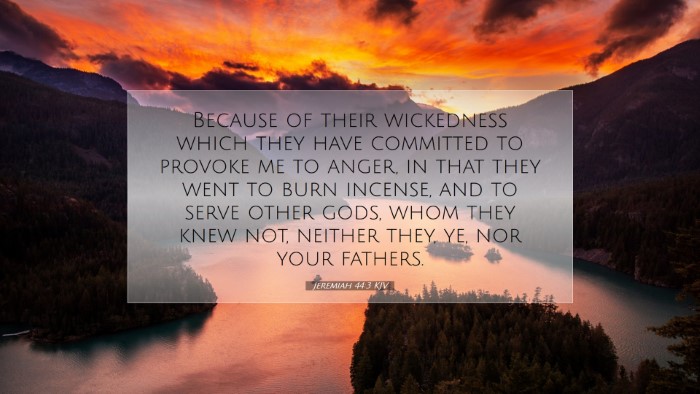Commentary on Jeremiah 44:3
Jeremiah 44:3 (KJV): "Because of their wickedness which they have committed to provoke me to anger, in that they went to burn incense, and to serve other gods, whom they knew not, neither they, ye, nor your fathers."
Introduction
The verse of Jeremiah 44:3 serves as a poignant reminder of Israel’s persistent idolatry and the consequent divine wrath. This commentary draws on insights from Matthew Henry, Albert Barnes, and Adam Clarke to unfold the theological and pastoral implications inherent in this scripture.
Contextual Overview
This verse appears within a broader narrative where the prophet Jeremiah addresses the people of Judah, particularly those who fled to Egypt after the Babylonian conquest of Jerusalem. The backdrop of this message is the disobedience of the people who turned to idol worship, notably in Egypt, despite witnessing God's faithfulness. This context is crucial as it highlights the challenge of historical memory against the allure of pagan practices.
Theological Insights
The Nature of Idolatry
Henry emphasizes the insidiousness of idolatry, noting that it is not merely the act of worshiping a different god, but rather a profound rejection of the relationship with the one true God. He posits that the Israelites' choice to burn incense and serve other gods signifies a deep-rooted spiritual rebellion.
Provocation of Divine Anger
Barnes elaborates on the concept of provoking God to anger, asserting that God's anger is a response to persistent sin. He contextualizes this anger as both just and necessary; a loving God cannot tolerate rebellion against His covenant. Barnes’ exegesis also exposes the emotional gravity of such provocation, reminding us that God’s love establishes the boundaries of His wrath.
Historical Ignorance
Clarke highlights the phrase "whom they knew not," underscoring the willful ignorance of the Israelites regarding their actions. He emphasizes that historical knowledge of God’s redemptive acts was not merely intellectual but was meant to engender a relationship of trust and faithfulness. By turning to idols, they turned away from the God who had led them through generations.
Pastoral Applications
The Temptation of Syncretism
This verse serves as a warning against the modern-day tendency toward syncretism, where believers might blend the worship of Christ with secular ideologies or practices. Pastors should consider how the allure of worldly practices can lead congregations to a point of spiritual complacency.
The Consequences of Disobedience
Leaders should help their congregations understand the concept of covenant disobedience. Reflecting on this passage, one can lead discussions on accountability and the importance of spiritual fidelity to God. The consequences experienced by Israel serve as a cautionary tale for contemporary faith communities.
Encouragement for Repentance
In light of the scriptural admonition, there is a pastoral call to repentance and restoration. Just as God warns the people through Jeremiah, pastors are called to gently lead their communities back to a posture of surrender and worship. The invitation to turn back to God is an essential aspect of the Christian message.
Concluding Thoughts
Jeremiah 44:3 encapsulates a critical moment of divine communication concerning idolatry and disobedience. The insights from the commentaries reveal the weight of spiritual rebellion and God’s unwavering claim over His people. It is a call to remembrance, urging believers to heed the historical reality of God’s redemptive work and to remain steadfast in their faith amidst cultural pressures. Through collective reflection and teaching, pastors and scholars can utilize this text to promote a deeper understanding of covenant faithfulness.
Further Reflections
- Understanding Idolatry: Encouraging deeper discussions on modern forms of idolatry in contemporary faith.
- Spiritual Heritage: Engaging with the historical understanding of God's interaction with His people.
- Responsive Leadership: Equipping leaders to provide guidance and warning against cultural distractions.


